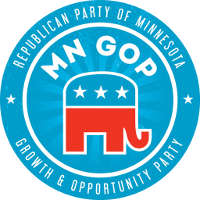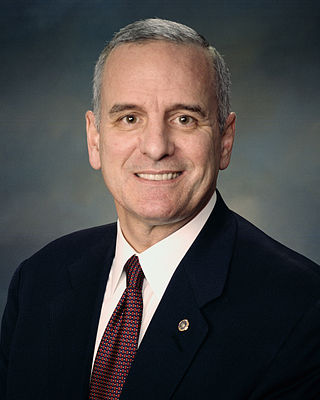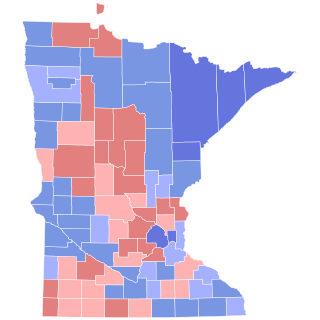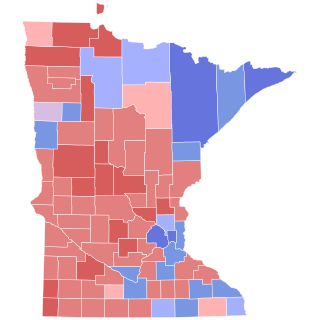
Mark Brandt Dayton is an American politician who served as the 40th governor of Minnesota from 2011 to 2019. He served as a United States Senator representing Minnesota from 2001 to 2007 and as Minnesota State Auditor from 1991 to 1995. He is a member of the Minnesota Democratic–Farmer–Labor Party (DFL), which affiliates with the national Democratic Party.

The Republican Party of Minnesota is the state affiliate of the Republican Party in Minnesota and the oldest active political party in the state. Founded in 1855, the party controls four of Minnesota's eight congressional House seats. The last Republican governor of the state was Tim Pawlenty, who served from 2003 to 2011. The party's headquarters is located in Edina, Minnesota and the current chairman is David Hann. Starting in 2023 and as a result of the 2022 elections, the Republican Party of Minnesota does not have substantial power over the state, holding no statewide executive offices, no U.S. Senate seats, and minorities in the state legislatures.

The 2008 United States Senate election in Minnesota took place on November 4, 2008. After a legal battle lasting over eight months, the Democratic–Farmer–Labor Party (DFL) candidate, Al Franken, defeated Republican incumbent Norm Coleman in one of the closest elections in the history of the Senate, with Coleman's Senate predecessor Dean Barkley taking third place. Franken took his oath of office on July 7, 2009, more than half a year after the end of Coleman's term on January 3, 2009.

The 2010 Minnesota gubernatorial election was held on Tuesday, November 2, 2010 to elect the 40th Governor of the U.S. state of Minnesota for a four-year term to begin in January 2011. The general election was contested by the major party candidates State Representative Tom Emmer (R–Delano), former U.S. Senator Mark Dayton (DFL), and Independence Party candidate Tom Horner. After a very close race, Dayton was elected governor. Emmer would be elected to the United States House of Representatives four years later.
Elections were held in Minnesota on Tuesday, November 2, 2010. Primary elections took place on August 10, 2010.
Elections were held in Minnesota on November 4, 2008. Primary elections took place on September 9, 2008.

The 2012 United States Senate election in Minnesota took place on November 6, 2012, concurrently with the U.S. presidential election as well as other elections to the United States Senate and House of Representatives as well as various state and local elections. Incumbent Democratic–Farmer–Labor U.S. Senator Amy Klobuchar faced Republican State Representative Kurt Bills. Klobuchar was reelected in a landslide, defeating Bills by almost one million votes and carrying all but two of the state's 87 counties by double digits. This election marked the first time since 1996 that an incumbent Democratic senator was re-elected and the first time since 1976 that an incumbent Democratic senator was re-elected to this seat.

The 2012 United States House of Representatives elections in Minnesota were held on Tuesday, November 6, 2012 to elect the eight U.S. representatives from the state of Minnesota. The elections coincided with the elections of other federal and state offices, including a quadrennial presidential election and an election to the U.S. Senate. Primary elections were held on August 14, 2012.

The 2014 Minnesota gubernatorial election took place on November 4, 2014, to elect the governor of Minnesota concurrently with the election to Minnesota's Class II U.S. Senate seat, as well as other elections to the United States Senate in other states and elections to the United States House of Representatives and various state and local elections.

The 2014 United States Senate election in Minnesota was held on November 4, 2014, to elect a member of the United States Senate to represent the State of Minnesota, concurrently with the election of the Governor of Minnesota, as well as other elections to the United States Senate in other states and elections to the United States House of Representatives and various state and local elections.

A special election was held in the U.S. state of Minnesota on February 12, 2013 to elect a new representative for District 14A in the Minnesota House of Representatives, caused by the resignation of Representative Steve Gottwalt on January 7, 2013. A primary election was not held. The election coincided with the District 19A special election. Tama Theis, the Republican Party of Minnesota nominee, won the special election.

A special election was held in the U.S. state of Minnesota on February 12, 2013 to elect a new representative for District 19A in the Minnesota House of Representatives, caused by the resignation of Representative Terry Morrow on January 7, 2013. A primary election was held on January 29, 2013. The election coincided with the District 14A special election. Clark Johnson, the Minnesota Democratic–Farmer–Labor Party (DFL) nominee, won the special election.

The 2014 United States House of Representatives elections in Minnesota took place in the U.S. state of Minnesota on November 4, 2014, to elect Minnesota's eight representatives in the United States House of Representatives for two-year terms, one from each of Minnesota's eight congressional districts. Primary elections were held on August 12, 2014.

The 2014 Minnesota Secretary of State election was held on November 4, 2014, to elect the Minnesota Secretary of State.

The 2014 Minnesota House of Representatives election was held in the U.S. state of Minnesota on November 4, 2014, to elect members to the House of Representatives of the 89th Minnesota Legislature. A primary election was held in several districts on August 12, 2014.

The 2014 Minnesota Attorney General election was held on November 4, 2014, to elect the Minnesota Attorney General.

The 2014 Minnesota State Auditor election was held on November 4, 2014, to elect the Minnesota State Auditor.

The 2016 Minnesota Senate election was held in the U.S. state of Minnesota on November 8, 2016, to elect members to the Senate of the 90th and 91st Minnesota Legislatures. A primary election was held in several districts on August 9, 2016. The election coincided with the election of the other house of the Legislature, the House of Representatives.

The 2018 Minnesota gubernatorial election took place on November 6, to elect the 41st Governor of Minnesota as incumbent Democratic governor Mark Dayton chose not to run for re-election for a third term. The Democratic nominee was congressman Tim Walz from Minnesota's 1st congressional district while the Republicans nominated Hennepin County commissioner Jeff Johnson. The Independence Party of Minnesota didn't field a candidate for the first time since 1994. Going into the election the polls showed Walz ahead and the race was characterized as lean or likely DFL.
A general election was held in the U.S. state of Minnesota on November 6, 2018. All of Minnesota's executive officers were up for election as well as all the seats in the Minnesota House of Representatives, several judicial seats, two United States Senate seats, Minnesota's eight seats in the United States House of Representatives, and several seats for local offices. Special elections were also held for a Minnesota Senate seat and Minnesota's Class 2 U.S. Senate seat. A primary election to nominate Republican and Democratic–Farmer–Labor (DFL) candidates and several judicial and local primary elections were held on August 14, 2018.

















